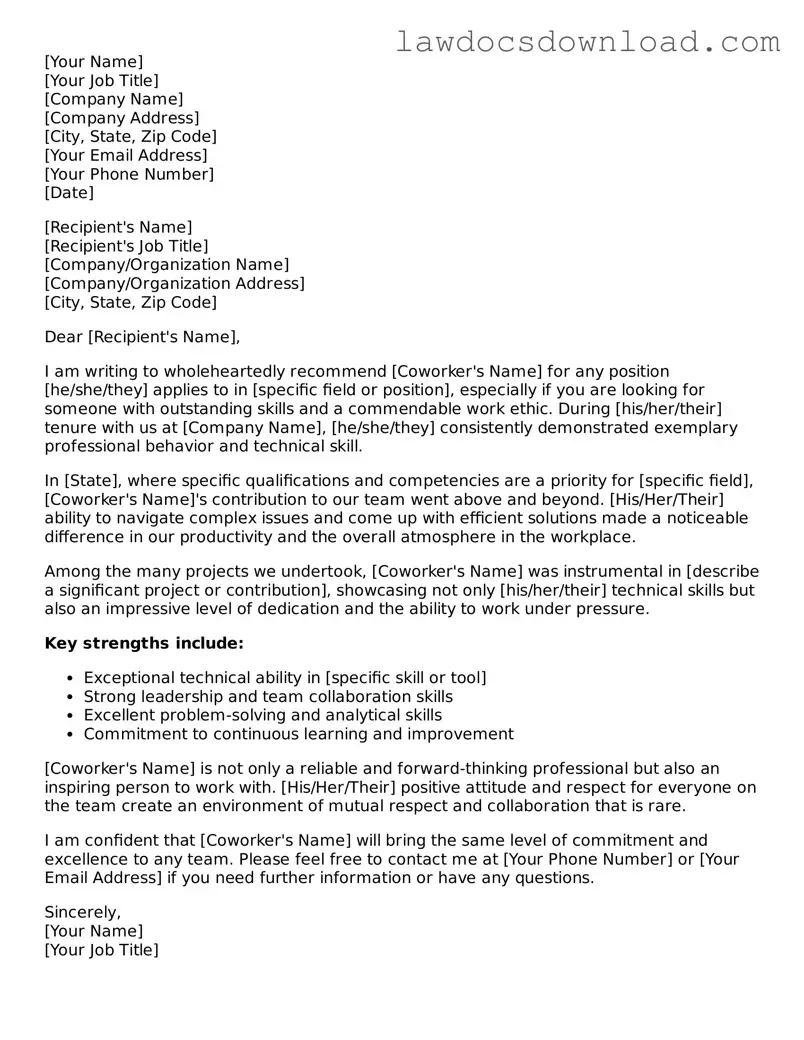A Letter of Recommendation for a Coworker is quite similar to a Professional Reference Letter. Both documents serve the purpose of vouching for an individual's skills, work ethic, and overall performance. In a Professional Reference Letter, a colleague or supervisor details specific contributions the individual has made to the workplace, often highlighting special projects or significant achievements. This document is primarily used by employers to gauge the potential of a job candidate through the experiences shared by previous colleagues or supervisors.
The Personal Character Reference Letter is another document that bears resemblance to the Letter of Recommendation for a Coworker. While the former emphasizes personal qualities and virtues, such as integrity, reliability, and character, it is used in various situations beyond employment, including legal settings and housing applications. This type of letter focuses more on the individual's personal attributes rather than professional accomplishments, providing a comprehensive view of their character.
An Endorsement Letter shares similarities with a Letter of Recommendation for a Coworker in that both aim to support the individual seeking a new role, project, or position. The Endorsement Letter, however, is particularly prevalent within academic and entertainment industries, or for product endorsements, where the reputation and opinion of the endorser can significantly influence decisions. This document highlights the individual’s aptitudes and capabilities from the perspective of someone with authority or fame in their field.
The Letter of Support, while generally more broad in its application, is akin to the Letter of Recommendation for a Coworker when it's used to back a person’s application or nomination for a scholarship, grant, or special program. The Letter of Support tends to emphasize the candidate’s suitability and the potential impact of their success on a project or community. It not only comments on the individual’s abilities but also on the benefits of their proposed work or study, linking their personal achievements with broader outcomes.
An Academic Recommendation Letter is closely related to the corporate-focused Letter of Recommendation for a Coworker, tailored specifically for the academic environment. It is most often written by teachers, professors, or academic advisors and concentrates on a student’s performance, potential for further study, and suitability for scholarships, internships, or higher education programs. This document meticulously details the student's achievements, academic strengths, and capability to excel in future academic endeavors.
Performance Review Letters and the Letter of Recommendation for a Coworker share the objective of assessing an individual’s contributions and performance within a professional setting. However, Performance Review Letters are typically internal documents used by organizations to formally evaluate an employee’s work throughout a specific period, providing constructive feedback and setting goals. Though not usually shared externally, they reflect on aspects of an employee’s performance that could be pertinent for a recommendation letter.
A Job Offer Letter, while fundamentally different in its purpose - to offer employment rather than recommend a person for it, intersects with the Letter of Recommendation in significant ways. It outlines the terms of employment, including duties, compensation, and benefits, but often reflects the candidate’s desirable qualities that led to the offer. This shows the employer’s confidence in the individual's skills and fit for the role, indirectly reinforcing the positive attributes typically highlighted in a recommendation letter.

